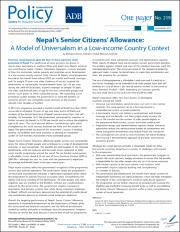Please use this identifier to cite or link to this item:
https://repositorio.ipea.gov.br/handle/11058/15519Files in This Item:
| File | Description | Size | Format | |
|---|---|---|---|---|
| en_IPCOnePager219.pdf | 79.08 kB | Adobe PDF |  View/Open |
| Title: | Nepal’s Senior Citizens’ Allowance: A Model of Universalism in a Low-income Country Context |
| Authors: | Samson, Michael |
| Abstract: | One Pager No. 219 – Nepal’s Senior Citizens’ Allowance: A Model of Universalism in a Low-income Country Context By Michael Samson, Economic Policy Research Institute Universal social pensions open the door to more expansive social protection in Nepal. The significance of social pensions has grown in recent years, particularly in southern Africa and South Asia. Nepal’s universal non-contributory Senior Citizens’ Allowance represents a classic example of how this instrument tackles poverty and promotes social development in a low-income country context. Early criticism of Nepal’s initial programme focused on low benefit levels (about USD2 per month) and limited coverage— only for people 75 years and older. Evidence of success inspired the government to substantially increase benefit levels (by 150 per cent during the 2008/09 fiscal year), expand coverage (to people 70 years and older, and from 60 years of age for the most vulnerable groups) and extend social grants to other vulnerable groups. The expanding social protection system enables the government to share the benefits of economic growth and strengthen social cohesion as the country rebuilds from decades of conflict. (…) |
| metadata.dc.rights.holder: | International Policy Centre for Inclusive Growth United Nations Development Programme |
| metadata.dc.rights.license: | O texto e dados desta publicação podem ser reproduzidos desde que as fontes sejam citadas. Reproduções com fins comerciais são proibidas. |
| metadata.dc.type: | One Pager |
| Appears in Collections: | Publicações do IPC-IG |
Items in DSpace are protected by copyright, with all rights reserved, unless otherwise indicated.

